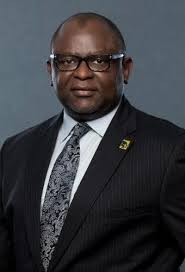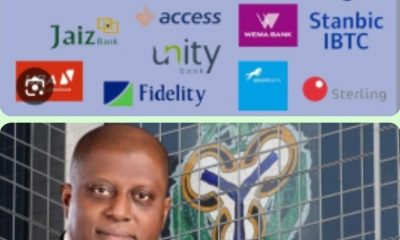Business
FirstBank: Redefining the ‘Heritage of First’ with smart digital banking

As information technology evolves rapidly, the disruption or advancement in the banking sector will continue to be digitised. Only the bank that can transform itself into truly effective digital organisation and embrace the changes in digital technologies and consumer behaviour will survive and thrive in both the current and future digital environments.
Leveraging experience spanning over a century of dependable services, Nigeria’s premier financial institution, First Bank of Nigeria Limited, also called FirstBank, has kept pace with the evolving global operating environment, responding to the dynamic needs of its customers, investors, regulators, host communities, employees and other stakeholders. Through a balanced approach to plan execution, this iconic banking Brand has consolidated its industry leadership by maintaining trans-generational appeal and continually boosting its customer-base, which cuts across all segments in terms of size, structure and sectors.
With these unbroken business operations experience, FirstBank has continued to build relationships and alliances with key sectors of the economy that have served as strategic building blocks for the wellbeing, growth and development of the country. Also, with its huge asset base and expansive branch network, as well as continuous re-invention, this Nigeria’s strongest banking franchise has maintained market leadership on all fronts in the nation’s financial services industry.
Minds are still refreshing on the 125 years anniversary of this leading financial services solutions provider in Nigeria. A milestone that will continue to speak volume of FirstBank’s journey through the ages, her footprints traversing the nook and cranny of Nations with indelible landmarks of several firsts in the development of the banking industry in Nigeria, and contributions to banking sectors across Africa, the World at large.
It cannot be forgotten in a hurry, not so soon, how on Friday, March 1, 2019, FirstBank had the world stand still as it held its symbolic flag hoisting ceremony across Nigeria and other countries where it does business – a historic happening which officially flags off the bank’s commemoration of attaining the milestone year of 125th.
The last 125 years has passed, FirstBank says it is now focusing in building for the next 125 years and beyond to purposefully blaze the trail in its industry thereby sustaining leadership position and remaining youthful; an effort, no doubt, that is aimed at redefining the “Heritage of First” into the world of digital banking.
According to the digital banking report for 2018, in the past, providing a seamless customer experience has only ever been secondary to other higher priority items for banking institutions. This has to change to providing digital solutions for customers in and out of the institutional doors.
Meanwhile, before the transition to digital banking in Nigeria, conventional banking system had held sway which historically started in 1952. As it lasted, the industry witnessed a lot of regulatory and institutional advances, with FirstBank notable as one of the five out of 89 banks then; and all through, when in 2004 the banking industry went through reformation.
It could be observed that, when today’s customers evaluate financial institutions, they don’t compare different banks anymore, they compare experiences that impact everything in their lives as consumers for better than ever, with real-time, smart digital services being delivered through various devices 24/7 at the snap of their fingertips.
To survive the digital environment, FirstBank has continued to put in place the right framework to compete and succeed in the banking industry of the future, with goals set to create more efficient operations, higher profits and happier customers, “You First”.
According to FirstBank’s Chief Executive Officer, Dr Adesola Adeduntan, the digital banking offerings of the Bank have been optimised to ensure ease of banking and convenience via other channels such as FirstMobile app, Firstonline, FirstMonie, USSD banking and WhatsApp banking. Fundamental shifts where staying relevant means becoming an active part of a customer’s digital life!
Explaining about the chat banking on WhatsApp, during one of its occasions, FirstBank’s CEO said, “It is one of the ways First Bank puts You First and enables you to stay connected with your contacts, loved ones, friends and finances all on the go while you chat with them because, at First Bank, we are driven to bolster relationships on all fronts, anywhere and anytime.”
It can also be recalled that, Dr Adeduntan said, “Mobile and digital banking leverages native and responsive digital innovations to deliver aesthetically consistent physical and digital experiences to customers. Thus, we deliver real time event driven information and offer to proactively serve the immediate and long term financial needs of customers.”
As the saying does go, with digital opportunity comes digital risk, FirstBank recognises that as customers continue to gravitate to the ease and speed of digital banking, the associated risks will be on the rise.
Telling it as it were to curb the anticipated risks head-on, FirstBank CEO said, “We have adopted a disciplined approach to deliver unique customer experiences through best in class value and customer service; enabling customers to initiate, pause and restart transactions across various channels at any time. Also, we use advanced analytics to evaluate customer behaviour, determine preferences and deliver personalised customer services.” The FirstBank Boss added that, “The bank is focusing on the feelings and behaviour with the aim to provide real value for the customers so as to have a positive impact with the product and the services provided to its customers.”
With FirstBank’s involvement in every stage of national growth and development, the Bank has recorded laudable feats since the advent of digital banking in Nigeria. Starting from 1991, when the Bank introduced first ATM (automated teller machine) in Marina, Lagos, it now has more than 2,700 ATMs across its 730 business locations, 18,000 Agent Banking spread and has earned itself the 2nd Bank in Africa and 1st in Nigeria to issue 10 million cards.
In 2007, FirstBank introduced the innovative credit administration software called Innovative Finnone credit administration software, being the first bank in Africa to pioneer the service. Other notable corporate transformation projects included the launch of FirstContact, the 24/7 multi-lingual integrated and interactive customer service contact centre, a key component of FirstBank’s service delivery transformation, which revolutionised customer feedback processes.
FirstBank is also the first to launch Biometric ATM in Nigeria, consistent with its tradition of pioneering far-reaching innovation in the financial services industry. In 2010, FirstBank becomes the first organisation to be granted notable international standardization certifications, the prestigious Information Security Management System (ISMS) Certification, which is the world’s highest accreditation for information protection and security; and Business Continuity Management System Certification, both from the International Organisation for Standardisation (ISO), following rigorous certification processes by the British Standards Institution (BSI), a leading organization in the field of auditing management systems and processes.
In 2011, FirstBank launched the first Cash Deposit ATM. The Bank has earned recognition as the “Most Innovative Bank in Africa” by the African Banker, attesting to its forward-thinking approach; and named “Nigeria’s Number One Banking Brand” by Brand Finance Top 500 Banking Brands by The Banker, an international banking magazine published by Financial Times, Ltd.
Acknowledged by Interswitch, Africa-focused integrated digital payments and commerce company, as the first financial institution in Nigeria to achieve 100 million sustained monthly transactions in electronic payment, in December 2015 and again in May 2016. Same year, FirstBank celebrated 20 years of partnership with Western Union Money Transfer.
In 2017, FirstBank total number of Firstmonie (FirstBank money wallet) users hit 4,035,307 and with over 6 million digital banking users (the fastest mobile banking penetration across Africa).
Indeed, FirstBank is the first indigenous organisation in Nigeria to launch Human Resource Solution in the Cloud. As at 2018, it won Best Retail Bank in Nigeria (an award given by the renowned Asian Banker Awards) for the 7th consecutive time. In that same year, processes the highest number of transactions on electronic channels in the industry annually, representing above 1.6 billion (about 33 per cent of the industry volume).
Awarded a second time back-to-back recognition for Digital Bank of Distinction, Nigeria; Firstbank, last year, won the Best Bank in Nigeria award for the 15th time, both by Global Finance Magazine.
By and large, FirstBank continues to seek out better solutions to digitise its offerings whilst optimising its workflow and lowering operational costs for the future ahead in digital banking. – National Accord.
Business
Nigeria’s Inflation Drops to 15.10% as NBS Reports Deflationary Trend

Nigeria’s headline inflation rate declined to 15.10 per cent in January 2026, marking a significant drop from 27.61 per cent recorded in January 2025, according to the latest Consumer Price Index (CPI) report released by the National Bureau of Statistics.
The report also showed that month-on-month inflation recorded a deflationary trend of –2.88 per cent, representing a 3.42 percentage-point decrease compared to December 2025. Analysts say the development signals easing price pressures across key sectors of the economy.
Food inflation stood at 8.89 per cent year-on-year, down from 29.63 per cent in January 2025. On a month-on-month basis, food prices declined by 6.02 per cent, reflecting lower costs in several staple commodities.
The data suggests a sustained downward trajectory in inflation over the past 12 months, pointing to improving macroeconomic stability.
The administration of President Bola Ahmed Tinubu has consistently attributed recent economic adjustments to ongoing fiscal and monetary reforms aimed at stabilising prices, boosting agricultural output, and strengthening domestic supply chains.
Economic analysts note that while the latest figures indicate progress, sustaining the downward trend will depend on continued policy discipline, exchange rate stability, and improvements in food production and distribution.
The January report provides one of the clearest indications yet that inflationary pressures, which surged in early 2025, may be moderating.
Bank
Alpha Morgan to Host 19th Economic Review Webinar

Alpha Morgan to Host 19th Economic Review Webinar
In an economy shaped by constant shifts, the edge often belongs to those with the right information.
On Wednesday, February 25, 2026, Alpha Morgan Bank will host the 19th edition of its Economic Review Webinar, a high-level thought leadership session designed to equip businesses, investors, and individuals with timely financial and economic insight.
The session, which will hold live on Zoom at 10:00am WAT and will feature economist Bismarck Rewane, who will examine the key signals influencing Nigeria’s economic direction in 2026, including policy trends, market movements, and global developments shaping the local landscape.
With a consistent track record of delivering clarity in uncertain times, the Alpha Morgan Economic Review continues to provide practical context for decision-making in a dynamic environment.
Registration for the 19th Alpha Morgan Economic Review is free and can be completed via https://bit.ly/registeramerseries19
It is a bi-monthly platform that is open to the public and is held virtually.
Visit www.alphamorganbank to know more.
Business
GTBank Launches Quick Airtime Loan at 2.95%

GTBank Launches Quick Airtime Loan at 2.95%
Guaranty Trust Bank Ltd (GTBank), the flagship banking franchise of GTCO Plc, Africa’s leading financial services group, today announced the launch of Quick Airtime Loan, an innovative digital solution that gives customers instant access to airtime when they run out of call credit and have limited funds in their bank accounts, ensuring customers can stay connected when it matters most.
In today’s always-on world, running out of airtime is more than a minor inconvenience. It can mean missed opportunities, disrupted plans, and lost connections, often at the very moment when funds are tight, and options are limited. Quick Airtime Loan was created to solve this problem, offering customers instant access to airtime on credit, directly from their bank. With Quick Airtime Loan, eligible GTBank customers can access from ₦100 and up to ₦10,000 by dialing *737*90#. Available across all major mobile networks in Nigeria, the service will soon expand to include data loans, further strengthening its proposition as a reliable on-demand platform.
For years, the airtime credit market has been dominated by Telcos, where charges for this service are at 15%. GTBank is now changing the narrative by offering a customer-centric, bank-led digital alternative priced at 2.95%. Built on transparency, convenience and affordability, Quick Airtime Loan has the potential to broaden access to airtime, deliver meaningful cost savings for millions of Nigerians, and redefine how financial services show up in everyday life, not just in banking moments.
Commenting on the product launch, Miriam Olusanya, Managing Director of Guaranty Trust Bank Ltd, said: “Quick Airtime Loan reflects GTBank’s continued focus on delivering digital solutions that are relevant, accessible, and built around real customer needs. The solution underscores the power of a connected financial ecosystem, combining GTBank’s digital reach and lending expertise with the capabilities of HabariPay to deliver a smooth, end-to-end experience. By leveraging unique strengths across the Group, we are able to accelerate innovation, strengthen execution, and deliver a more integrated customer experience across all our service channels.”
Importantly, Quick Airtime Loan highlights GTCO’s evolution as a fully diversified financial services group. Leveraging HabariPay’s Squad, the solution reinforces the Group’s ecosystem proposition by bringing together banking, payment technology, and digital channels to deliver intuitive, one-stop experiences for customers.
With this new product launch, Guaranty Trust Bank is extending its legacy of pioneering digital-first solutions that have redefined customer access to financial services across the industry, building on the proven strength of its widely adopted QuickCredit offering and the convenience of the Bank’s iconic *737# USSD Banking platform.
About Guaranty Trust Bank
Guaranty Trust Bank (GTBank) is the flagship banking franchise of GTCO Plc, a leading financial services group with a strong presence across Africa and the United Kingdom. The Bank is widely recognized for its leadership in digital banking, customer experience, and innovative financial solutions that deliver value to individuals, businesses, and communities.
About HabariPay
HabariPay is the payments fintech subsidiary of GTCO Plc, focused on enabling fast, secure, and accessible digital payments for individuals and businesses. By integrating payments and digital technology, HabariPay supports innovative services that make everyday financial interactions simpler and more seamless.
Enquiries:
GTCO
Group Corporate Communication
[email protected]
+234-1-2715227
www.gtcoplc.com
-

 celebrity radar - gossips6 months ago
celebrity radar - gossips6 months agoWhy Babangida’s Hilltop Home Became Nigeria’s Political “Mecca”
-

 society6 months ago
society6 months agoPower is a Loan, Not a Possession: The Sacred Duty of Planting People
-

 society5 months ago
society5 months agoReligion: Africa’s Oldest Weapon of Enslavement and the Forgotten Truth
-

 news6 months ago
news6 months agoTHE APPOINTMENT OF WASIU AYINDE BY THE FEDERAL GOVERNMENT AS AN AMBASSADOR SOUNDS EMBARRASSING










You must be logged in to post a comment Login